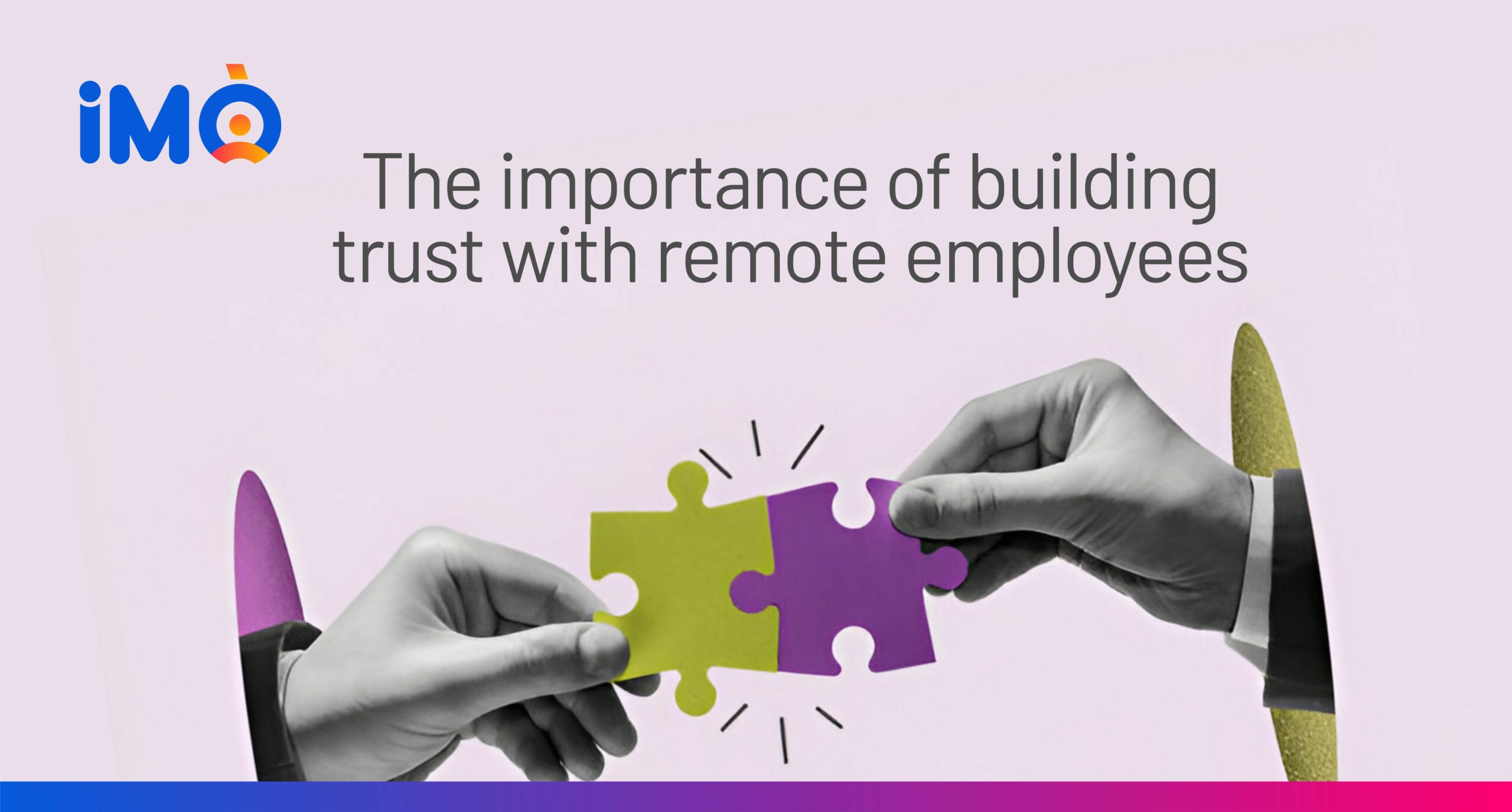Building trust with remote employees is vital as remote work becomes more prevalent. Remote teams, often dispersed across different geographical locations, face unique challenges related to communication, collaboration, and engagement. However, trust between managers and employees and among team members themselves is the foundation of any successful remote team.
Trust is not just an added benefit, but a necessity for ensuring a productive, engaged, and loyal workforce. It strengthens job satisfaction, enhances performance, and helps overcome the challenges of remote work.
Why Building Trust is Crucial
While remote work offers significant benefits like flexibility and autonomy, it can also create challenges, especially around maintaining employee morale and productivity. The absence of a physical office presence can lead to feelings of isolation, misunderstandings, and disengagement. Without trust, these challenges can exacerbate, undermining team cohesion and effectiveness.
Trust is the bedrock on which positive professional relationships are built. In a remote setting, trust makes employees feel secure in their roles and confident in their contributions. It enables open communication, reduces anxiety, and helps remote workers stay connected to the larger goals of the organization. Without trust, remote teams can struggle to maintain productivity and cohesion.
Employees who trust their managers and colleagues are more likely to take ownership of their tasks, collaborate effectively, and perform at a higher level. In this way, building trust with remote employees can significantly impact a company’s success, employee retention, and overall workplace satisfaction.
The Benefits of Building Trust
When trust is nurtured within a remote team, the impact extends beyond day-to-day operations. It can lead to improved communication, increased engagement, higher productivity, and stronger employee retention. One of the most significant benefits of trust is its ability to enhance communication.
In a remote work environment, effective communication becomes even more critical because teams rely heavily on digital tools and virtual meetings to collaborate. Trust encourages employees to speak openly, share their ideas, voice concerns, and offer feedback. This openness fosters a transparent culture where collaboration thrives, and team members feel valued and heard.
Trust also plays a major role in boosting employee engagement. Remote workers who feel trusted are more likely to take initiative and demonstrate greater loyalty to their company. They are not only more engaged in their own work but also proactive in solving problems and contributing to the team’s success. Engaged employees feel connected to the company’s mission and are motivated to help achieve its goals, which ultimately leads to better performance across the board.
Another significant benefit of trust is the increased productivity it fosters. In remote work settings, where employees manage their own schedules and workloads, trust eliminates the need for constant oversight. Employees who feel trusted are more likely to take ownership of their tasks and complete them efficiently. This autonomy, coupled with trust in their abilities, leads to greater overall productivity.
Furthermore, trust contributes to stronger employee retention. Remote work can sometimes make employees feel isolated or disconnected, but when they feel trusted and supported by their managers, they are more likely to stay loyal to the company and continue performing well. This sense of trust can make all the difference between employees staying with an organization long-term or seeking other opportunities.
Lastly, trust fosters team cohesion. A remote team that trusts one another can overcome the inherent challenges of working in different locations. Trust leads to better collaboration, reduced isolation, and a stronger sense of belonging within the team. When employees trust their colleagues, they are more likely to share knowledge, collaborate on projects, and support each other in overcoming challenges.
How to Build Trust with Remote Employees
Building trust with remote employees is a gradual process that requires intentionality and consistency. It is not something that can be accomplished overnight, but sustained effort from both managers and employees is necessary. There are several strategies that organizations can use to establish and nurture trust within their remote workforce.
One of the first steps in building trust is establishing clear expectations and goals from the beginning. Remote employees need to understand their roles, responsibilities, and the objectives they are expected to achieve. Setting measurable and realistic goals provides transparency, reducing ambiguity and helping employees focus on what is important. Clear expectations also help create a sense of fairness and demonstrate that everyone is on the same page, which is essential for fostering trust.
Regular and open communication is another critical component of trust-building. Since remote teams rely on digital communication, it is vital to create consistent opportunities for employees to engage with their managers and colleagues. Regular check-ins, one-on-one meetings, and team video calls help remote employees feel connected, valued, and heard. Informal conversations can also strengthen relationships by allowing managers to build rapport with their employees. It’s important to engage in both work-related discussions and casual conversations to foster a sense of camaraderie and trust.
Providing regular, constructive feedback is also key. Remote employees need to know how they are performing, and receiving clear, actionable feedback helps them understand where improvements can be made. Additionally, acknowledging and celebrating achievements big and small reinforces trust by making employees feel recognized and appreciated for their contributions.
Empowering remote employees is another essential strategy for building trust. Giving employees the autonomy to make decisions and manage their own time reinforces trust in their abilities. Micromanaging, on the other hand, can undermine trust and lead to frustration. When employees are trusted to manage their own work, they are more likely to feel invested in the success of their projects and the overall goals of the team.
Consistency and integrity are also central to trust-building. Managers must be reliable and transparent in their actions. Following through on commitments, being transparent in decision-making, and treating all team members equally helps to establish a culture of trust. Trust is also strengthened when managers act with integrity, demonstrating that they have the best interests of the team and the company at heart.
Building personal relationships with remote employees is another critical element of trust-building. Remote workers can often feel disconnected from the company, especially if they are working in different time zones or locations. Taking the time to get to know employees personally, whether through virtual coffee breaks, informal chats, or team-building activities, helps humanize the remote work experience. When employees feel that their managers genuinely care about them as individuals, it strengthens trust and builds a sense of belonging.
Lastly, demonstrating empathy and support is essential. Remote work can sometimes result in feelings of isolation, burnout, or anxiety, so managers should be attuned to the emotional needs of their employees. Offering support and flexibility, whether through additional resources, adjusting workloads, or simply checking in on employees’ well-being, reinforces trust and shows that the company values its employees beyond their work output.
Challenges in Building Trust
Despite the many benefits, building trust in remote teams can present challenges. One of the primary obstacles is the lack of face-to-face interaction. In traditional office settings, much of the communication happens in person, helping to build rapport and trust. Remote teams, however, rely on digital tools like emails, video calls, and messaging platforms, which can sometimes lead to misunderstandings or a lack of clarity. Consistent, effective communication is essential to overcoming this challenge.
Cultural differences can also pose a challenge when managing remote teams. Remote employees often come from diverse backgrounds, which can influence their communication styles, work habits, and expectations. Managers should be mindful of these differences and work to create an inclusive environment where everyone feels respected. Promoting cross-cultural awareness and open dialogue is crucial for building trust among team members.
Technological barriers can also make trust-building more difficult. Issues such as unreliable internet connections, incompatible software, or difficulties using remote tools can hinder communication and collaboration. Companies must invest in the right technology and provide employees with the necessary training to ensure effective and seamless remote work.
Time zone differences can further complicate communication and coordination. When team members are spread across multiple time zones, scheduling meetings and providing timely feedback can be challenging. Clear communication expectations and flexibility in meeting scheduling can help mitigate this issue.
Conclusion
Building trust with remote employees is a vital element for creating a productive, engaged, and loyal workforce. Trust enhances communication, boosts engagement, drives productivity, and strengthens retention. To cultivate trust, managers must set clear expectations, maintain regular communication, provide constructive feedback, and empower their employees. Despite the challenges that may arise, such as lack of face-to-face interaction, cultural differences, technological barriers, and time zone issues, these obstacles can be overcome with consistent effort, empathy, and the right tools.
In an era where remote work is increasingly common, building trust is not just a strategy it’s a necessity for long-term success. Organizations that prioritise trust will be better equipped to navigate the challenges of remote work and emerge stronger, more resilient, and more successful in the future.

